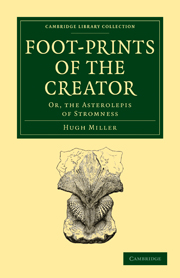Book contents
- Frontmatter
- TO THE READER
- Contents
- LIST OF WOOD-CUTS
- STROMNESS AND ITS ASTEROLEPIS.—THE LAKE OF STENNIS
- THE DEVELOPMENT HYPOTHESIS, AND ITS CONSEQUENCES
- THE RECENT HISTORY OF THE ASTEROLEPIS.—ITS FAMILY
- CEREBRAL DEVELOPMENT OF THE EARLIER VERTEBRATA.—ITS APPARENT PRINCIPLE
- THE ASTEROLEPIS.—ITS STRUCTURE, BULK, AND ASPECT
- FISHES OF THE SILURIAN ROCKS, UPPER AND LOWER.—THEIR RECENT HISTORY, ORDER, AND SIZE
- HIGH STANDING OF THE PLACOIDS.—OBJECTIONS CONSIDERED
- THE PLACOID BRAIN.—EMBRYOTIC CHARACTERISTICS NOT NECESSARILY OF A LOW ORDER
- THE PROGRESS OF DEGRADATION.—ITS HISTORY
- EVIDENCE OF THE SILURIAN MOLLUSCS.—OF THE FOSSIL FLORA.—ANCIENT TREE
- SUPERPOSITION NOT PARENTAL RELATION.—THE BEGINNINGS OF LIFE
- LAMARCKIAN HYPOTHESIS OF THE ORIGIN OF PLANTS.—ITS CONSEQUENCES
- THE TWO FLORAS, MARINE AND TERRESTRIAL.—BEARING OF THE EXPERIENCE ARGUMENT
- THE DEVELOPMENT HYPOTHESIS IN ITS EMBRYOTIC STATE.—OLDER THAN ITS ALLEGED FOUNDATIONS
- FINAL CAUSES.—THEIR BEARING ON GEOLOGIC HISTORY.—CONCLUSION
THE DEVELOPMENT HYPOTHESIS, AND ITS CONSEQUENCES
Published online by Cambridge University Press: 29 August 2010
- Frontmatter
- TO THE READER
- Contents
- LIST OF WOOD-CUTS
- STROMNESS AND ITS ASTEROLEPIS.—THE LAKE OF STENNIS
- THE DEVELOPMENT HYPOTHESIS, AND ITS CONSEQUENCES
- THE RECENT HISTORY OF THE ASTEROLEPIS.—ITS FAMILY
- CEREBRAL DEVELOPMENT OF THE EARLIER VERTEBRATA.—ITS APPARENT PRINCIPLE
- THE ASTEROLEPIS.—ITS STRUCTURE, BULK, AND ASPECT
- FISHES OF THE SILURIAN ROCKS, UPPER AND LOWER.—THEIR RECENT HISTORY, ORDER, AND SIZE
- HIGH STANDING OF THE PLACOIDS.—OBJECTIONS CONSIDERED
- THE PLACOID BRAIN.—EMBRYOTIC CHARACTERISTICS NOT NECESSARILY OF A LOW ORDER
- THE PROGRESS OF DEGRADATION.—ITS HISTORY
- EVIDENCE OF THE SILURIAN MOLLUSCS.—OF THE FOSSIL FLORA.—ANCIENT TREE
- SUPERPOSITION NOT PARENTAL RELATION.—THE BEGINNINGS OF LIFE
- LAMARCKIAN HYPOTHESIS OF THE ORIGIN OF PLANTS.—ITS CONSEQUENCES
- THE TWO FLORAS, MARINE AND TERRESTRIAL.—BEARING OF THE EXPERIENCE ARGUMENT
- THE DEVELOPMENT HYPOTHESIS IN ITS EMBRYOTIC STATE.—OLDER THAN ITS ALLEGED FOUNDATIONS
- FINAL CAUSES.—THEIR BEARING ON GEOLOGIC HISTORY.—CONCLUSION
Summary
Every individual, whatever its species or order, begins and increases until it attains to its state of fullest development, under certain fixed laws, and in consequence of their operation. The microscopic monad developes into a fœtus, the fœetus into a child, the child into a man; and, however marvellous the process, in none of its stages is there the slightest mixture of miracle;—from beginning to end, all is progressive development, according to a determinate order of things. Has Nature, during the vast geologic periods, been pregnant, in like manner, with the human race? and is the species, like the individual, an effect of progressive development, induced and regulated by law? The assertors of the revived hypothesis of Maillet and Lamarck reply in the affirmative. Nor, be it remarked, is there positive atheism involved in the belief. God might as certainly have originated the species by a law of development, as he maintains it by a law of development;—the existence of a First Great Cause is as perfectly compatible with the one scheme as with the other: and it may be necessary thus broadly to state the fact, not only in justice to the Lamarckians, but also fairly to warn their non-geological opponents, that in this contest the old anti-atheistic arguments, whether founded on the evidence of design or on the preliminary doctrine of final causes, cannot be brought to bear.
- Type
- Chapter
- Information
- Footprints of the CreatorOr, the Asterolepis of Stromness, pp. 13 - 23Publisher: Cambridge University PressPrint publication year: 2009First published in: 1849



